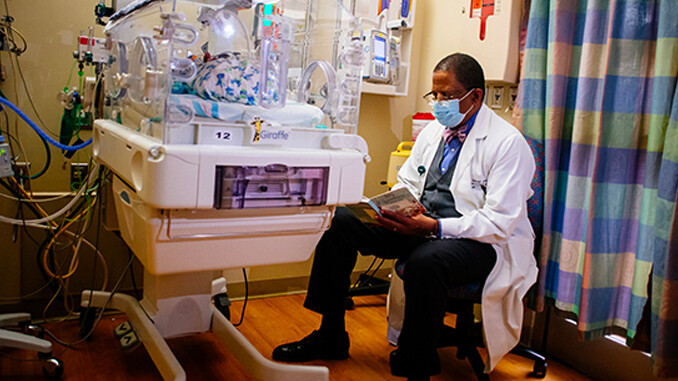
“Literacy is an essential tool for our youth to learn and grow into successful individuals who positively shape our Birmingham community.”
Published: January 8, 2022
Reading to children has proved to be helpful for their development. Reading to newborn and premature infants? Turns out that is important too. Premature and sick newborn infants have an increased risk for neurodevelopmental deficits, including in language and reading. This can adversely affect school performance and later employment. The University of Alabama at Birmingham and Children’s of Alabama have launched the NICU Bookworms reading program to help decrease developmental deficits and encourage shared reading starting at birth.
UAB Medicine hosted a book signing and reading event at the UAB Women and Infants Center with Birmingham mayor Randall Woodfin; Selwyn Vickers, M.D., dean of the UAB Marnix E. Heersink School of Medicine; Mitchell Cohen, M.D., chair of the UAB Department of Pediatrics; Waldemar Carlo, M.D., co-director of the Division of Neonatology; and Viral G. Jain, M.D., assistant professor in the Division of Neonatology to celebrate the official launch of the program.
“Literacy is an essential tool for our youth to learn and grow into successful individuals who positively shape our Birmingham community,” Woodfin says. “The Bookworms program demonstrates short- and long-term health benefits of reading and shows that it is never too early to lay a foundation for literacy development.”
Jain created the program at UAB and Children’s after studying the positive impacts of reading aloud to neonatal intensive care unit infants. To accompany the program, Jain co-wrote a children’s book titled “Baby Bookworm” that families in the UAB Level IV Regional Neonatal Intensive Care Unit and Children’s NICU will receive. He also teamed up with three-time Grammy award-winning members of Zac Brown Band, Coy Bowles and Phil Tan, to write “Sweet Little Baby (NICU Lullaby)” to encourage reading to all infants starting at birth.
“Shared book reading is a major source of language exposure across childhood and a tool for parent-infant bonding,” Jain says. “Emergent literacy is an important domain of child development, given its importance to long-term health outcomes.”
Preterm infants do not receive the normal auditory exposure they normally would while in the womb. Coupled with the loud noises common in NICUs, both sick and preterm infants lack a significant amount of human sound exposure needed to help their brains develop during this period of rapid brain growth. These NICU infants have a harder time reacting to external stimuli while maintaining equilibrium in bodily systems such as keeping their heart rate steady, which can lead to overstimulation and stress.
The NICU Bookworms’ guidelines follow the principles of the Synactive Theory of Infant Development, a framework for understanding the behavior of premature and sick infants. The guidelines help caregivers better respond to infant cues and take active roles in their care while using books as a medium to bond. The Bookworms program aims to increase quality word exposure through books and to establish reading routines with the parents to continue at home.
Additionally, NICUs are often places of high stress for infants and their parents. In Jain’s study, overwhelmed parents were less likely to hold, feed and talk to their infants. These types of interactions, while seemingly small, can help soothe the infants and improve cardiac, respiratory and developmental health. Conversely, parents who read aloud to their infants reported feeling hope, empowerment, a decrease in stress and an increase in parent-infant bonding.
“The first 1,000 days of a child’s life are extremely important,” Vickers says. “Love, reading and stimulation are vital to a newborn’s well-being. I feel privileged to help kick off this program that will help our NICU infants and their families.”
Jain will continue studying the developmental impacts of reading through infants enrolled in the programs at UAB and Children’s. He hopes to expand the program to other NICUs in the community, and throughout the state and country. Community members can support the NICU Bookworms program through monetary and book donations. For more information, please contact bookworms@uabmc.edu.

